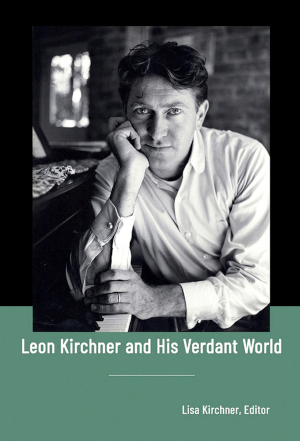Leon Kirchner
1919 - 2009
American
Summary
Leon Kirchner was born on January 24, 1919 of Russian parents in Brooklyn, grew up in Los Angeles, and studied with Arnold Schoenberg, Roger Sessions, and Ernest Bloch. Stylistically, Kirchner remained remarkably individual; earlier influences of Hindemith, Bartók, and Stravinsky soon yielded to a wholehearted identification with the aesthetics, if not necessarily the specific procedures, of Schoenberg, Berg, and Webern.
Extraordinarily gifted as both a pianist and a conductor, Kirchner was first and foremost a composer. A member of the American Academies of Arts and Letters and of Arts and Sciences, he was honored twice by the New York Music Critics’ Circle (String Quartets Nos. 1 and 2), and received the Naumburg Award (Piano Concerto No. 1), the Pulitzer Prize (String Quartet No. 3), the Friedheim Award (Music for Cello and Orchestra), and commissions from, among others, the Ford, Fromm, and Koussevitzky Foundations, the New York Philharmonic, the Philadelphia Orchestra, St. Paul Chamber Orchestra, Spoleto and Santa Fe Chamber Music Festivals, the Boston Symphony Orchestra, the Chamber Music Society of Lincoln Center, and Elizabeth Sprague Coolidge. He also conducted at a number of leading music festivals around the world, most recently at Ravinia. He taught for many years at Harvard University.
Leon Kirchner and His Verdant World
An anthology of sixty-nine essays, letters, and interviews, by Kirchner and his colleagues spanning sixty years of collaboration in the arts and sciences.

Edited by Lisa Kirchner ~ Verdant World Productions, xiv + 375 pages, $27.95 © 2022
Available at: verdantworldproductions.com | verdantworldrecords.org | amazon.com
An artist must create a personal cosmos, a verdant world in continuity with tradition, further fulfilling man’s “awareness” his “degree of consciousness,” and bringing new subtilization, vision and beauty to the elements of experience. It is in this way that Idea, powered by conviction and necessity, will create its own style and the singular, momentous structure capable of realizing its intent. — Leon Kirchner
The composer's own published writings — stylistically imaginative and prophetic — unveil his evolving concerns relevant to the arts and society, while also providing resonant accounts of his cherished mentors. Interleaved with photos, manuscripts, and art, this book illuminates a burgeoning era of contemporary music. Fellow travelers in his cosmos write with erudition and gift imparting their insights and consummate understanding of the tenets and qualities of Kirchner's verdant world. — Lisa Kirchner
Whether you are discovering Kirchner (1919-2009) and his music for the first time or are among his lifelong aficionados, this book is an invaluable cornucopia of information and proves to be delightful reading.… It’s an extraordinary book in a unique format that provides insight into the musical outlook and private personality of a major figure in contemporary American music. — Mark Evans, Classical Voice North America
Biography
Leon Kirchner was born on January 24, 1919 of Russian parents in Brooklyn; grew up in Los Angeles; and studied with Arnold Schoenberg, Roger Sessions, and Ernest Bloch. Stylistically, Kirchner remained remarkably individual; earlier influences of Hindemith, Bartók, and Stravinsky soon yielded to a wholehearted identification with the aesthetics, if not necessarily the specific procedures, of Schoenberg, Berg, and Webern.
Extraordinarily gifted as both a pianist and a conductor, Kirchner was first and foremost a composer. A member of the American Academies of Arts and Letters and of Arts and Sciences, he was honored twice by the New York Music Critics' Circle (String Quartets Nos. 1 and 2), and received the Naumburg Award (Piano Concerto No. 1), the Pulitzer Prize (String Quartet No. 3), the Friedheim Award (Music for Cello and Orchestra); and commissions from, among others, the Ford, Fromm, and Koussevitzky Foundations; the New York Philharmonic, The Philadelphia Orchestra, the St. Paul Chamber Orchestra, the Spoleto and Santa Fe Chamber Music Festivals, the Boston Symphony Orchestra, The Chamber Music Society of Lincoln Center, and Elizabeth Sprague Coolidge. He was composer-in-residence and a performer at the Santa Fe Chamber Music Festival, the Tanglewood Music Center, Tokyo Music Today (Takemitsu Festival), and the Spoleto (Charleston), Aldeburgh, and Marlboro Music Festivals. He also conducted at a number of leading music festivals around the world, most recently at Ravinia. He taught for many years at Harvard University.
Kirchner's last works include The Forbidden, for James Levine and the Boston Symphony Orchestra; Music for Cello and Orchestra, for Yo-Yo Ma and the Philadelphia Orchestra (recorded on Sony Classical); Trio No. 2 for the Kalichstein-Laredo-Robinson Trio; Of Things Exactly as They Are, a work for orchestra, chorus, and soloists for the Boston Symphony Orchestra; and String Quartet No. 4 for the Orion Quartet. Following their premiere of String Quartet No. 4, the Orion Quartet recorded Kirchner's complete quartets — works which span a 57-year period — for Albany Records.
Performers who championed Kirchner's work include Yo-Yo Ma, who toured and recorded both Music for Cello and Orchestra and Triptych for Sony; The Chamber Music Society of Lincoln Center; Continuum; pianists Peter Serkin, who commissioned and recorded Interlude (BMG), and Leon Fleisher; cellist Carter Brey; flutist Paula Robison; conductors Oliver Knussen, Hugh Wolff, and John Adams; and the trios of Kalichstein-Laredo-Robinson and Buswell-Parnas-Luvisi.
Other recordings include his first three string quartets (Boston Composers String Quartet, Albany) and Nonesuch's all-Kirchner recording which includes the Concerto for Violoncello, Ten Winds, and Percussion; the Piano Trio; Five Piano Pieces; and Music for Twelve, featuring the Boston Symphony Chamber Players. Of Music for Twelve, Allan Kozinn of The New York Times wrote: "There is magic in the interplay between the 12 soloistic lines, and in the way instrumental colors seem to grow from each other to form lengthy melodies."
Leon Kirchner's music is published exclusively by Associated Music Publishers.
— September 2012
